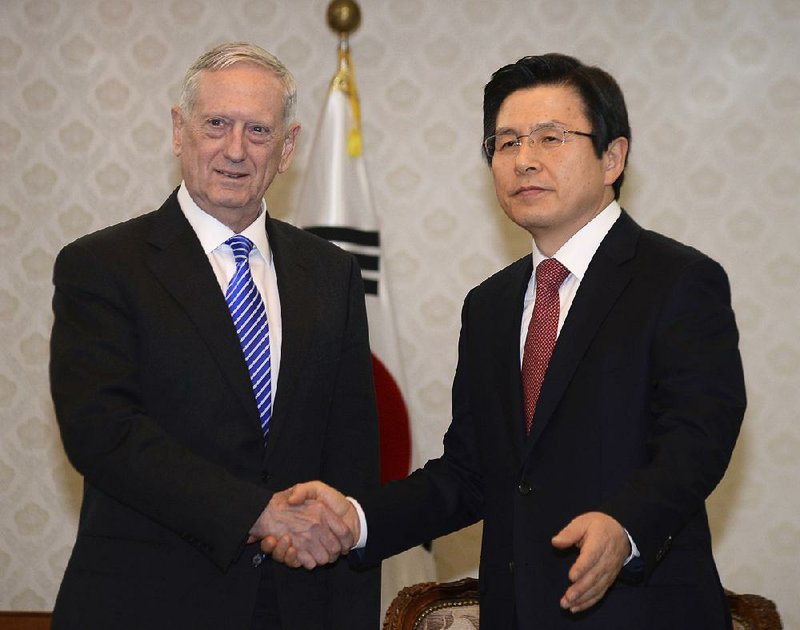SEOUL, South Korea -- U.S. Defense Secretary Jim Mattis pledged this morning that the United States would live up to its security commitments, signaling a strong partnership with Asian allies while vowing a strong response against North Korean aggression.
RELATED ARTICLES
http://www.arkansas…">Democrats' boycott fails to derail EPA nominee http://www.arkansas…">Trump targets tax law on church campaigning http://www.arkansas…">In freeze, IRS can't hire blind http://www.arkansas…">Top U.S. diplomat goes to work http://www.arkansas…">Campus cancels rightist's speech http://www.arkansas…">Israeli vows new settlement http://www.arkansas…">Senate sends coal-rule repeal to Trump http://www.arkansas…">Arkansans: Prayer meals uplifting http://www.arkansas…">Once denied, Iranian welcomed to LA http://www.arkansas…">Tehran snubs Trump warning http://www.arkansas…">Senators reassure Australia after call
Speaking alongside South Korean Defense Minister Han Min-koo, Mattis promised that the U.S. policy of defending allies was "ironclad."
"The United States stands by its commitments, and we stand with our allies, the South Korean people," he said.
He also sent a message to North Korea, which he blamed for "threatening rhetoric and behavior" in its efforts to build up nuclear and missile capacity.
[PRESIDENT TRUMP: Details on administration, previous coverage, photos, videos]
"Any attack on the United States, or its allies, will be defeated, and any use of nuclear weapons would be met with a response that would be effective and overwhelming," he said.
Mattis' visit to Seoul is the first stop in his first overseas trip since he was sworn in as President Donald Trump's defense secretary last month.
After touching down Thursday in Seoul, Mattis met with senior officials in the South Korean capital, including Hwang Kyo-ahn, the acting president. The retired Marine general's visit takes place at a time of political upheaval in South Korea caused by a political scandal as the Constitutional Court considers whether to uphold lawmakers' vote to impeach President Park Geun-hye.
Speaking to reporters before his arrival, Mattis said he would use the talks in Seoul, and those later in the week in Tokyo, to solicit the views of South Korean and Japanese leaders about how best to mitigate the threat from North Korea. "Together we confront the North Korean situation," he said.
The visit is an indication of mounting worry about what Mattis described as unpredictable actions by North Korea. Kim Jong Un, North Korea's leader, suggested at the beginning of the year that his country soon would be ready to test an intercontinental ballistic missile, making a strike on the United States possible.
The visit is an indication of mounting worry about what Mattis described as unpredictable actions by North Korea. Kim Jong Un, North Korea's leader, suggested at the beginning of the year that his country soon would be ready to test an intercontinental ballistic missile, making a strike on the United States possible.
North Korea's secretive leadership has conducted five nuclear tests -- the most recent in September -- stoking U.S. worries about the country's offensive ability.
Patrick Cronin, a scholar at the Center for a New American Security, said that despite sanctions and dire poverty, North Korea was "on the cusp of being able to demonstrate and deploy all the sinews of a nuclear-weapon state."
"Indeed, within the span of President Trump's current four-year term in office, it is probable that Pyongyang will deploy a mobile, nuclear-tipped ICBM capable of striking U.S. territory," he said.
Last month, then-Defense Secretary Ashton Carter said the United States would shoot down an ICBM from North Korea only if it posed a direct threat.
Trump has tweeted that North Korean development of a nuclear-capable missile able to strike U.S. soil "won't happen," but he has also made isolationist comments and suggested that non-nuclear states should be able to acquire nuclear weapons.
Mattis declined to say what additional actions the U.S. might take in an attempt to rein in North Korea. He did say he would address deployment of the Terminal High Altitude Aerial Defense system, known as THAAD, with Korean officials.
"If it were not for the provocative behavior of North Korea, we would have no need for THAAD out here," Mattis said.
Hwang has said the defense system's deployment is "inevitable" given the North's missile threat, adding that his government was consulting with the United States to deploy the system "as soon as possible."
"THAAD is a defense tool whose deployment should not be delayed anymore," he said at a recent news conference. "We are explaining our position in various ways to neighboring countries like China who are concerned about the THAAD deployment."
His remarks seek to assuage concerns among Asian nations about the direction of Trump's foreign policy, after comments during the presidential campaign in which Trump called on Japan and South Korea to pay more for a U.S. military presence that has been a fundamental aspect of U.S. policy in Asia for decades.
There are almost 30,000 U.S. troops stationed in South Korea and about 50,000 in Japan.
Information for this article was contributed by Missy Ryan of The Washington Post and by Michael R. Gordon and Choe Sang-Hun of The New York Times.
A Section on 02/03/2017


